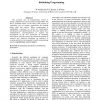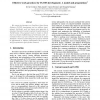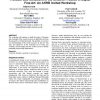106 search results - page 11 / 22 » LIDA and a Theory of Mind |
HICSS
2007
IEEE
14 years 1 months ago
2007
IEEE
Firms invest heavily to develop on-line cooperative systems in the hope of creating unique value in the minds of their customers. However, when system use begins to decline, firms...
ITNG
2006
IEEE
14 years 22 days ago
2006
IEEE
The accepted view of programming, rooted in Turing’s fundamental characterization of algorithms, has had a profound impact on the theory and practice of computing with yet broad...
HICSS
2005
IEEE
14 years 10 days ago
2005
IEEE
We review the literature on Free/Libre Open Source Software (FLOSS) development and on software development, distributed work and teams more generally to develop a theoretical mod...
CANDC
2005
ACM
13 years 8 months ago
2005
ACM
The workshop will explore in depth the nature of freedom and constraint in the creative process in digital fine art from the perspective of embodied mind. The problem is crucial t...
HICSS
2006
IEEE
14 years 23 days ago
2006
IEEE
The study investigates the role of ICT in facilitating democracy. The role of ICT in maintaining status quo, or structure of the society can be explained using structuration theor...



